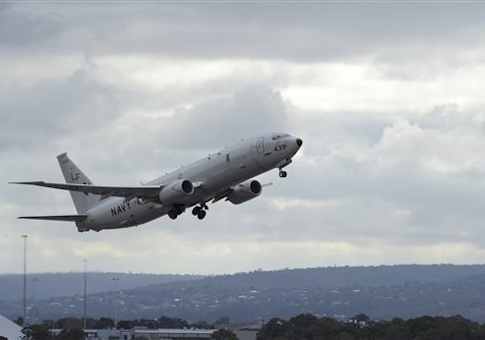National Security Adviser Susan Rice was pressed by Chinese leaders last week to end all U.S. surveillance flights near China, and the White House said Monday that the flights will continue.
"We have made clear that our flights are totally lawful under international law and we made clear we have no plans to alter them due to Chinese pressure," an administration official told the Washington Free Beacon.
Rice was pressed to end U.S. maritime surveillance flights by Chinese leaders, including Gen. Fan Changlong, vice chairman of the Communist Party Central Military Commission, in Beijing Sept. 9 following a dangerous encounter between a Chinese Su-27 jet and a U.S. Navy P-8 anti-submarine warfare aircraft in the South China Sea.
The Chinese jet flew within 20 feet of the P-8 in what the Pentagon called a "dangerous" and unprofessional encounter on Aug. 19.
Patrick Ventrell, a spokesman for the National Security Council, confirmed that the issue of U.S. surveillance flights was raised during Rice’s meetings in Beijing but declined to say how Rice responded to the Chinese demands.
Ventrell stated in an email, however: "U.S. officials have consistently registered strong concerns to the Chinese about unsafe and unprofessional intercepts, which pose a risk to the safety and wellbeing of the aircrews involved, are inconsistent with customary international law, and jeopardize our ability to develop bilateral military-to-military relations."
"The United States conducts routine military flights in international airspace that contribute to the peace and stability of the region," he added. "These flights are consistent with international law."
U.S. defense officials said the issue was also discussed in Rice’s meeting with Chinese President Xi Jinping. The officials said there are concerns among some at the Pentagon that the White House might cave in to Chinese demands on the surveillance as a result of Rice’s talks.
China’s military has denied its pilot flew dangerously close to the P-8 and insisted the pilot acted professionally.
The Pentagon however, has said the Su-27 did a barrel roll maneuver over the P-8 and at one point flew within 20 feet of the aircraft’s wing. The Pentagon has video of the close encounter but has not released it.
The incident was described as the most dangerous aerial intercept since the April 2001 mid-air collision between a Chinese J-8 and U.S. EP-3 surveillance jet. The Chinese jet crashed and the pilot was killed. The EP-3 made an emergency landing on Hainan Island in the South China Sea and the crew was held captive for 11 days.
Fan, during the meeting last week, told Rice that "close in" aerial and naval surveillance of Chinese coasts should be stopped, according to the state-run Xinhua news agency
According to Fan, the United States must take a "correct" view of China’s military buildup and "decrease and even end close-in ship and aircraft surveillance of China."
"We hope the U.S. can promote the healthy development of new China-U.S. military ties with concrete actions," Fan, viewed as China’s most powerful military leader, was quoted as saying.
The Pentagon disclosed the P-8 encounter several days after it occurred and hinted that if similar dangerous aerial intercepts take place that the military will curtail future exchanges with China’s military.
The Pentagon has launched an ambitious program of military exchanges with China in an effort to try and build trust with the communist-led People’s Liberation Army. However, the Chinese military has increased its harassment of U.S. aircraft this year.
Increased U.S. surveillance of China is one of the Obama administration’s key elements of its so-called pivot to Asia that is designed to monitor China’s large-scale conventional and nuclear forces buildup, which has been taking place largely in secret.
Other elements of the pivot include moving additional warships and submarines to the region and increasing military collaboration with regional allies, including Japan, Australia, and India.
The White House rejection of Beijing’s demand to end surveillance followed similar comments last week by Adm. Jonathan Greenert.
"We will continue to operate in international airspace," the admiral said. "We’ve made that clear and we will continue."
Following a speech at the Carnegie Endowment, Greenert also Malaysia could host P-8s in the future.
"Recently the Malaysians have offered us to fly detachments of P-8s out of … right down here in East Malaysia," he said. "So you can see the closeness for the South China Sea."
Discussions on the use of a Malaysian air base at Sabah, in the northeast part of the island chain, have been underway for some time.
Deployment of P-8 would likely upset China, which has declared most of the South China Sea as its territorial waters, angering neighbors throughout the region.
Rice was in Beijing to discuss President Obama’s visit to China in November for the Asia-Pacific Economic Cooperation summit.
During her meetings, Rice said the two militaries need to work out mutual understandings for military activities in international waters and airspace in the region.
